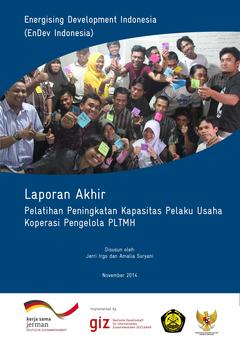Difference between revisions of "Indonesia - Productive Use of Energy through Cooperative"
***** (***** | *****) |
***** (***** | *****) |
||
| Line 31: | Line 31: | ||
<br/> | <br/> | ||
| + | |||
| Line 41: | Line 42: | ||
[[File:Pengembangan Ekonomi Produktif Koperasi berbasis Energi Terbarukan.pdf|thumb|240px|2016 report - Indonesian]] | [[File:Pengembangan Ekonomi Produktif Koperasi berbasis Energi Terbarukan.pdf|thumb|240px|2016 report - Indonesian]] | ||
| + | [[Category:Indonesia]] | ||
| + | [[Category:Productive_Use]] | ||
| + | [[Category:Renewable_Energy]] | ||
[[Category:Rural_Development]] | [[Category:Rural_Development]] | ||
| − | |||
| − | |||
| − | |||
Revision as of 07:58, 23 May 2017
Background
In 2013, Ministry of Cooperative and Small Medium Enterprises (KUKM) initiated the development of ten micro-hydro power (MHP) plants through cooperatives with main purpose to provide electricity for productive uses activities. The program in KUKM had different approaches compared to another rural electrification projects from other ministries which granted the local cooperative directly with the MHP. This choice answers the hesitation on MHP sustainability, such as by addressing ownership into a legal institution that can have profitable activities from the grant.
The aim is mainly to empower local cooperatives to increase their productive activities using power plant facilities. Cooperatives are responsible to operate and manage the MHP, as well as running the rural businesses by utilising the electricity generated from the MHP.
Align with the abovementioned purpose, GIZ cooperated with KUKM to support this initiative through technical review to ensure that the MHP complied with best practices in MHP development and met the design requirement; also to train the management to operate and administer the MHP. Moreover, this cooperation developed the entrepreneurial competence of the management and cooperative members, especially for those who were already running a business. Thereby, the training comprised of various topics such as business identification, marketing, human resource, investment and access to loan, accounting and business planning.
This cooperation continues from 2014 until 2016
Experiences
for the participants
By using CEFE Business Canvas Model, the participants could experience the business process, and within short-time, the participants were able to map the potential and opportunities to improve their business, both individually and collectively as a cooperative member. Aside trom it, the participants had experienced to achieve business target that consisted of improvement in the four aspects of management, namely marketing, production, human resources and organisation, and financial.
for cooperative
Cooperatives as the training local partners could experience to be the training organisers as well as learnt to do socialisation to the members and rural communities to use the electricity from MHP to leverage their business
Publications on productive use of energy with cooperative






















